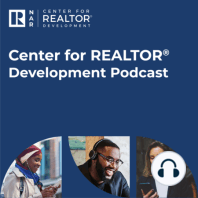72 min listen

028: Land Sales with Jeramy Stephens and Justin Osborne
028: Land Sales with Jeramy Stephens and Justin Osborne
ratings:
Length:
85 minutes
Released:
Jul 2, 2019
Format:
Podcast episode
Description
All real estate begins with the land. Today’s episode features two guests who are experts in land sales. Jeramy Stephens (Arkansas) & Justin Osborne (Colorado) are both members of the REALTORS® Land Institute (RLI) and join Monica on the show today to talk about how land sales differ from residential sales. They discuss the different types of land and the certification that’s available for land agents, as well as some of the important things to note about land sales in the East and the West. Jeramy Stephens has been in land and real estate for many, many years. He is currently the president of REALTORS® Land Institute (RLI). RLI is part of the NAR family and provides expertise, camaraderie, and resources for real estate professionals. It also offers the Accredited Land Consultant (ALC) designation. There are several different types of land: agricultural land, timberland, recreational land, and transitional land. The RLI promotes education to understand different land uses and purposes for these types of lands. Just like in other facets of real estate, there are different specialties in the land business, and they each have their own rules. There are six required courses to get the ALC designation and 104 hours. The three core classes are Land Investment Analysis, Land 101, and Transitional Land. In addition to these three core classes, there are “elective” classes, depending on where your interests lie. A portfolio of $10 million is also required. When looking at the value of land, it’s important to consider what it’s being used for or what it’s been used for in the past. As a residential agent, if someone comes to you with a piece of land, you can ask questions to determine its highest and best use. Then you can direct your client to an expert in one of those areas, who can appraise or assess the land appropriately. Some land properties are comped regionally, so they are compared with other similar properties in neighboring states or regions. When it gets to a specific activity, it needs to be priced as close in proximity as possible. Jeramy’s passion is farmland, which tends to be a little bit easier to price than some other types of land property. Despite some of the struggles farmers are facing, the demand for ag land is still quite strong. Farm and ag land are also a potential investment opportunity. There is a lot of due diligence required for farmland, so it’s important to know what to do and who to ask when you need help. Residential real estate agents and land agents can work together to meet their clients’ needs. If you’re not the one to help them, be the one to get them another agent. You want to make sure that as a Realtor®, you are operating in your area of expertise, and referring your clients to someone else when it’s not your area of expertise. Jeramy is also interested in developmental or transitional land. This is taking raw land, usually on the outside of a growing community, and figuring out zoning, sewage, water, taxes, etc. This process can take a long time and varies from state to state. These properties can be a win-win for the agent and the community, but it’s important to make sure it’s done right so everyone benefits from it. There are some new developments in technology in land sales, including better maps and more complete data. Having all of this technology makes things work a lot faster and smoother. The company Jeramy works for offers 360-degree land tours of properties, so clients can see properties on their computers before seeing the land. In the Eastern United States, one of the biggest things to consider is wetlands and water rights. Mineral rights are also important, though maybe more so in the West. There are also many areas in the East that are developing and bringing more people in, and this is especially important for agents who work with transitional land. Jeramy’s final word is to remind and encourage REALTORS® that we’re all professionals in what we do. Know what
Released:
Jul 2, 2019
Format:
Podcast episode
Titles in the series (98)
010: Smart Home Technology with Chad Curry: As society becomes more forward-thinking, smart technology is moving into our homes. Todays’ guest, Chad Curry, joins Monica to talk about smart home technology and other pieces of technology that affect REALTORS® and homeowners. In... by NAR’s Center for REALTOR® Development